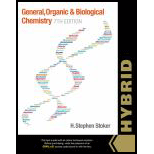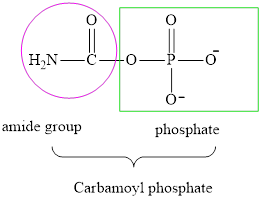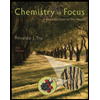
General, Organic, And Biological Chemistry, Hybrid (with Owlv2 Quick Prep For General Chemistry Printed Access Card)
7th Edition
ISBN: 9781305253070
Author: STOKER, H. Stephen
Publisher: Cengage Learning
expand_more
expand_more
format_list_bulleted
Concept explainers
Question
Chapter 26, Problem 26.57EP
Interpretation Introduction
Interpretation: To determine the chemical reactants needed to produce the compound carbamoyl phosphate.
Concept introduction: Carbamoyl phosphate is an intermediate or one of the fuel for the urea cycle. Ammonium ion produced via oxidative deamination reaction is converted into the carbamoyl phosphate which then enters the urea cycle.
The carbamoyl phosphate formation reaction is carried out in the mitochondrial matrix. Carbamoyl is the prefix used to represent an amide group. Thus carbamoyl phosphate is a molecule that contains a phosphate group attached to an amide

Expert Solution & Answer
Want to see the full answer?
Check out a sample textbook solution
Students have asked these similar questions
Complete the reaction in the drawing area below by adding the major products to the right-hand side.
If there won't be any products, because nothing will happen under these reaction conditions, check the box under the drawing area instead.
Note: if the products contain one or more pairs of enantiomers, don't worry about drawing each enantiomer with dash and wedge bonds. Just draw one molecule
to represent each pair of enantiomers, using line bonds at the chiral center.
+ More...
☐
☐
: ☐
+
G
1. NaOMe
Click and drag to start
drawing a structure.
2. H
+
6. Ammonia reacts with nitrogen monoxide and oxygen to form nitrogen and water vapor. If the
rate of consumption of NO is 4.5 mollitermin)
(a) Find the rate of reaction
(b) Find the rate of formations of N; and HO
(c) Find the rate of consumption of NH, and O
4NH: 4NO 0:4: +60
34. Give the expected major product of each of the following reactions.
Conc. HI
a. CH3CH2CH2OH
b. (CH3)2CHCH2CH2OH
Conc. HBr
H
Conc. HI
C.
OH
Conc.HCI
d. (CH3CH2)3COH
Chapter 26 Solutions
General, Organic, And Biological Chemistry, Hybrid (with Owlv2 Quick Prep For General Chemistry Printed Access Card)
Ch. 26.1 - Which of the following statements about dietary...Ch. 26.1 - Dietary protein materials as they leave the...Ch. 26.1 - The inactive form of pepsin is converted to its...Ch. 26.1 - Which of the following is not a proteolytic...Ch. 26.2 - The dominant use for the amino acids of the amino...Ch. 26.2 - The most abundant amino acid in the amino acid...Ch. 26.2 - Prob. 3QQCh. 26.3 - Prob. 1QQCh. 26.3 - Prob. 2QQCh. 26.3 - The net effect of transamination is to collect the...
Ch. 26.3 - Prob. 4QQCh. 26.3 - Prob. 5QQCh. 26.3 - Most aminotransferases are specific for the keto...Ch. 26.4 - Which of the following statements concerning the...Ch. 26.4 - Prob. 2QQCh. 26.4 - The two fuels for the urea cycle are a. carbamoyl...Ch. 26.4 - Prob. 4QQCh. 26.4 - Prob. 5QQCh. 26.4 - Prob. 6QQCh. 26.5 - Which of the following statements concerning the...Ch. 26.5 - Prob. 2QQCh. 26.5 - Prob. 3QQCh. 26.5 - Prob. 4QQCh. 26.6 - Prob. 1QQCh. 26.6 - How many of the standard amino acids are...Ch. 26.6 - The simplest pathways for amino acid biosynthesis...Ch. 26.7 - Prob. 1QQCh. 26.7 - Which of the following statements concerning the...Ch. 26.7 - Prob. 3QQCh. 26.7 - In the degradation of heme, the iron atom present...Ch. 26.8 - In degradation of the sulfur-containing amino acid...Ch. 26.8 - Prob. 2QQCh. 26.8 - Prob. 3QQCh. 26.8 - Prob. 4QQCh. 26.9 - Prob. 1QQCh. 26.9 - Prob. 2QQCh. 26.9 - Prob. 3QQCh. 26.10 - Prob. 1QQCh. 26.10 - Prob. 2QQCh. 26.10 - Prob. 3QQCh. 26 - Prob. 26.1EPCh. 26 - Indicate whether each of the following aspects of...Ch. 26 - Indicate whether each of the following pairings of...Ch. 26 - Indicate whether each of the following pairings of...Ch. 26 - Indicate whether each of the following statements...Ch. 26 - Prob. 26.6EPCh. 26 - Prob. 26.7EPCh. 26 - Prob. 26.8EPCh. 26 - Prob. 26.9EPCh. 26 - Prob. 26.10EPCh. 26 - Prob. 26.11EPCh. 26 - Prob. 26.12EPCh. 26 - Prob. 26.13EPCh. 26 - Prob. 26.14EPCh. 26 - Indicate whether each of the following situations...Ch. 26 - Indicate whether each of the following situations...Ch. 26 - Prob. 26.17EPCh. 26 - Prob. 26.18EPCh. 26 - Prob. 26.19EPCh. 26 - Prob. 26.20EPCh. 26 - Prob. 26.21EPCh. 26 - Prob. 26.22EPCh. 26 - Prob. 26.23EPCh. 26 - Prob. 26.24EPCh. 26 - Prob. 26.25EPCh. 26 - Prob. 26.26EPCh. 26 - Prob. 26.27EPCh. 26 - Prob. 26.28EPCh. 26 - Prob. 26.29EPCh. 26 - Prob. 26.30EPCh. 26 - Prob. 26.31EPCh. 26 - Prob. 26.32EPCh. 26 - Prob. 26.33EPCh. 26 - Prob. 26.34EPCh. 26 - Prob. 26.35EPCh. 26 - Prob. 26.36EPCh. 26 - Prob. 26.37EPCh. 26 - Prob. 26.38EPCh. 26 - Prob. 26.39EPCh. 26 - Prob. 26.40EPCh. 26 - Prob. 26.41EPCh. 26 - Prob. 26.42EPCh. 26 - Prob. 26.43EPCh. 26 - Draw the structure of the -keto acid produced from...Ch. 26 - Prob. 26.45EPCh. 26 - Prob. 26.46EPCh. 26 - Prob. 26.47EPCh. 26 - Prob. 26.48EPCh. 26 - Prob. 26.49EPCh. 26 - Prob. 26.50EPCh. 26 - Prob. 26.51EPCh. 26 - Prob. 26.52EPCh. 26 - Prob. 26.53EPCh. 26 - Prob. 26.54EPCh. 26 - Prob. 26.55EPCh. 26 - Prob. 26.56EPCh. 26 - Prob. 26.57EPCh. 26 - Prob. 26.58EPCh. 26 - Prob. 26.59EPCh. 26 - Prob. 26.60EPCh. 26 - Prob. 26.61EPCh. 26 - Prob. 26.62EPCh. 26 - Prob. 26.63EPCh. 26 - Prob. 26.64EPCh. 26 - Prob. 26.65EPCh. 26 - Prob. 26.66EPCh. 26 - Prob. 26.67EPCh. 26 - Prob. 26.68EPCh. 26 - Prob. 26.69EPCh. 26 - Prob. 26.70EPCh. 26 - Prob. 26.71EPCh. 26 - Prob. 26.72EPCh. 26 - Prob. 26.73EPCh. 26 - Prob. 26.74EPCh. 26 - Prob. 26.75EPCh. 26 - Prob. 26.76EPCh. 26 - Prob. 26.77EPCh. 26 - Prob. 26.78EPCh. 26 - Prob. 26.79EPCh. 26 - Prob. 26.80EPCh. 26 - Prob. 26.81EPCh. 26 - Prob. 26.82EPCh. 26 - Prob. 26.83EPCh. 26 - Prob. 26.84EPCh. 26 - Prob. 26.85EPCh. 26 - Prob. 26.86EPCh. 26 - Prob. 26.87EPCh. 26 - Prob. 26.88EPCh. 26 - Prob. 26.89EPCh. 26 - Prob. 26.90EPCh. 26 - Prob. 26.91EPCh. 26 - Prob. 26.92EPCh. 26 - Prob. 26.93EPCh. 26 - Prob. 26.94EPCh. 26 - Prob. 26.95EPCh. 26 - Prob. 26.96EPCh. 26 - Prob. 26.97EPCh. 26 - Which bile pigment is responsible for the...Ch. 26 - Prob. 26.99EPCh. 26 - Prob. 26.100EPCh. 26 - Prob. 26.101EPCh. 26 - Prob. 26.102EPCh. 26 - Prob. 26.103EPCh. 26 - Prob. 26.104EPCh. 26 - Prob. 26.105EPCh. 26 - Prob. 26.106EPCh. 26 - Prob. 26.107EPCh. 26 - Prob. 26.108EPCh. 26 - Prob. 26.109EPCh. 26 - Prob. 26.110EPCh. 26 - Prob. 26.111EPCh. 26 - Prob. 26.112EPCh. 26 - Prob. 26.113EPCh. 26 - Prob. 26.114EPCh. 26 - Prob. 26.115EPCh. 26 - Prob. 26.116EP
Knowledge Booster
Learn more about
Need a deep-dive on the concept behind this application? Look no further. Learn more about this topic, chemistry and related others by exploring similar questions and additional content below.Similar questions
- 42. Which of the following halogenated compounds can be used successfully to prepare a Grignard reagent for alcohol synthesis by subsequent reaction with an aldehyde or ketone? Which ones cannot and why? H3C CH3 a. Br H OH b. Cl C. I H H d. Cl e. H OCH3 Br Harrow_forwardFor each reaction below, decide if the first stable organic product that forms in solution will create a new CC bond, and check the appropriate box. Next, for each reaction to which you answered "Yes" to in the table, draw this product in the drawing area below. Note for advanced students: for this problem, don't worry if you think this product will continue to react under the current conditions - just focus on the first stable product you expect to form in solution. ? Will the first MgBr product that forms in this reaction create a new CC bond? olo ? OH جمله O Yes Ⓒ No MgCl ? Will the first product that forms in this reaction create a new CC bond? Click and drag to start drawing a structure. Yes No X ☐ : ☐ टे PHarrow_forwardAssign all the protonsarrow_forward
- 9 7 8 C 9 8 200 190 B 5 A -197.72 9 8 7 15 4 3 0: ང་ 200 190 180 147.52 134.98 170 160 150 140 130 120 110 100 90 90 OH 10 4 3 1 2 -143.04 140. 180 170 160 150 140 130 120 110 100 90 CI 3 5 1 2 141.89 140.07 200 190 180 170 160 150 140 130 120 110 100 ៖- 90 129. 126.25 80 70 60 -60 50 40 10 125.19 -129.21 80 70 3.0 20 20 -8 60 50 10 ppm -20 40 128.31 80 80 70 60 50 40 40 -70.27 3.0 20 10 ppm 00˚0-- 77.17 30 20 20 -45.36 10 ppm -0.00 26.48 22.32 ―30.10 ―-0.00arrow_forwardAssign all the carbonsarrow_forwardC 5 4 3 CI 2 the Righ B A 5 4 3 The Lich. OH 10 4 5 3 1 LOOP- -147.52 T 77.17 -45.36 200 190 180 170 160 150 140 130 120 110 100 90 80 70 60 50 40 30 20 10 ppm B -126.25 77.03 200 190 180 170 160 150 140 130 120 110 100 90 80 70 60 50 40 30 20 10 ppm 200 190 180 170 160 150 140 130 120 110 100 90 80 TO LL <-50.00 70 60 50 40 30 20 10 ppm 45.06 30.18 -26.45 22.36 --0.00 45.07 7.5 1.93 2.05 -30.24 -22.36 C A 7 8 5 ° 4 3 7.5 7.0 6.5 6.0 5.5 5.0 4.5 4.0 3.5 3.0 2.5 2.0 1.5 1.0 ppm 9 8 5 4 3 ཡི་ OH 10 2 7.5 7.0 6.5 6.0 5.5 5.0 4.5 4.0 3.5 3.0 2.5 2.0 1.5 5 4 3 2 that th 7 I 7.0 6.5 6.0 5.5 5.0 4.5 4.0 3.5 3.0 2.5 2.0 1.5 115 2.21 4.00 1.0 ppm 6.96 2.76 5.01 1.0 ppm 6.30 1.00arrow_forward
- Curved arrows were used to generate the significant resonance structure and labeled the most significant contribute. What are the errors in these resonance mechanisms. Draw out the correct resonance mechanisms with an brief explanation.arrow_forwardWhat are the: нсе * Moles of Hice while given: a) 10.0 ml 2.7M ? 6) 10.ome 12M ?arrow_forwardYou are asked to use curved arrows to generate the significant resonance structures for the following series of compounds and to label the most significant contributor. Identify the errors that would occur if you do not expand the Lewis structures or double-check the mechanisms. Also provide the correct answers.arrow_forward
arrow_back_ios
SEE MORE QUESTIONS
arrow_forward_ios
Recommended textbooks for you

 General, Organic, and Biological ChemistryChemistryISBN:9781285853918Author:H. Stephen StokerPublisher:Cengage Learning
General, Organic, and Biological ChemistryChemistryISBN:9781285853918Author:H. Stephen StokerPublisher:Cengage Learning Organic And Biological ChemistryChemistryISBN:9781305081079Author:STOKER, H. Stephen (howard Stephen)Publisher:Cengage Learning,
Organic And Biological ChemistryChemistryISBN:9781305081079Author:STOKER, H. Stephen (howard Stephen)Publisher:Cengage Learning, Chemistry for Today: General, Organic, and Bioche...ChemistryISBN:9781305960060Author:Spencer L. Seager, Michael R. Slabaugh, Maren S. HansenPublisher:Cengage LearningChemistry: Matter and ChangeChemistryISBN:9780078746376Author:Dinah Zike, Laurel Dingrando, Nicholas Hainen, Cheryl WistromPublisher:Glencoe/McGraw-Hill School Pub Co
Chemistry for Today: General, Organic, and Bioche...ChemistryISBN:9781305960060Author:Spencer L. Seager, Michael R. Slabaugh, Maren S. HansenPublisher:Cengage LearningChemistry: Matter and ChangeChemistryISBN:9780078746376Author:Dinah Zike, Laurel Dingrando, Nicholas Hainen, Cheryl WistromPublisher:Glencoe/McGraw-Hill School Pub Co Chemistry In FocusChemistryISBN:9781305084476Author:Tro, Nivaldo J., Neu, Don.Publisher:Cengage Learning
Chemistry In FocusChemistryISBN:9781305084476Author:Tro, Nivaldo J., Neu, Don.Publisher:Cengage Learning


General, Organic, and Biological Chemistry
Chemistry
ISBN:9781285853918
Author:H. Stephen Stoker
Publisher:Cengage Learning

Organic And Biological Chemistry
Chemistry
ISBN:9781305081079
Author:STOKER, H. Stephen (howard Stephen)
Publisher:Cengage Learning,

Chemistry for Today: General, Organic, and Bioche...
Chemistry
ISBN:9781305960060
Author:Spencer L. Seager, Michael R. Slabaugh, Maren S. Hansen
Publisher:Cengage Learning

Chemistry: Matter and Change
Chemistry
ISBN:9780078746376
Author:Dinah Zike, Laurel Dingrando, Nicholas Hainen, Cheryl Wistrom
Publisher:Glencoe/McGraw-Hill School Pub Co

Chemistry In Focus
Chemistry
ISBN:9781305084476
Author:Tro, Nivaldo J., Neu, Don.
Publisher:Cengage Learning